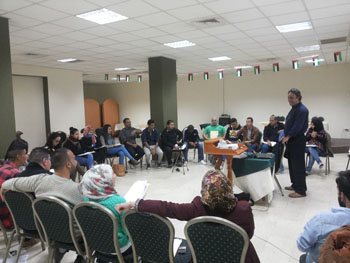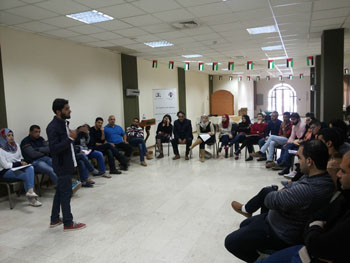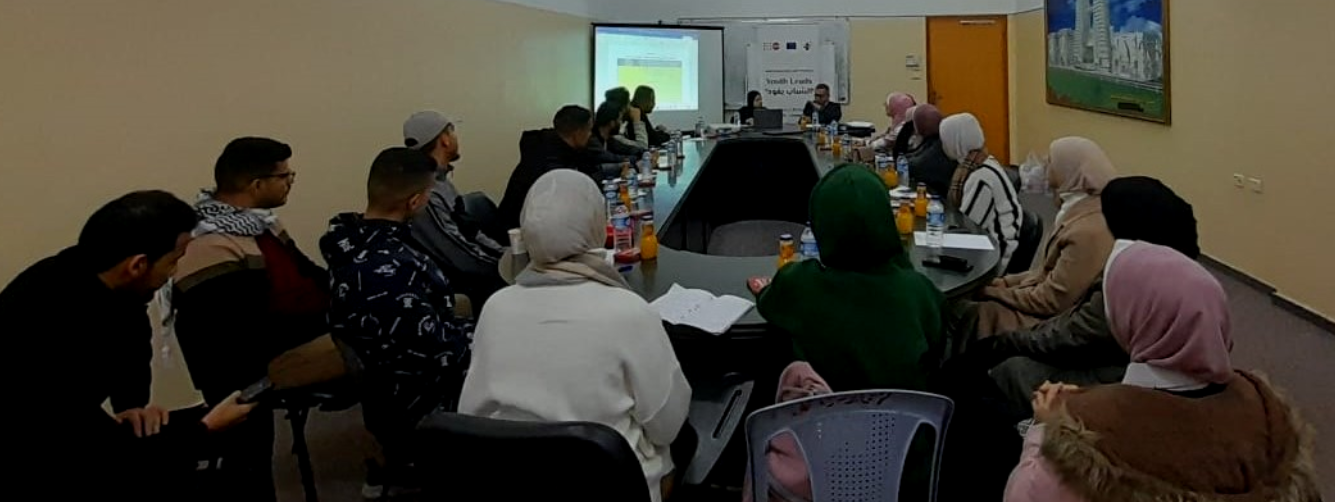
Ramallah -- Razan Ja’afar Salha from Aseera Shamaliyeh is a student at the Hisham Hajjawi College in Nablus and is very active in the Palestinian Youth Network established by MIFTAH as part of its program to empower youth leaders. She participated in a series of training courses organized by MIFTAH over several days and in two rounds. The training is part of MIFTAH’s interest in empowering and supporting young leaders in partnership with the Anti-Corruption Commission. The goal was to empower Palestinian youths to actively contribute in combating corruption..
Most recently, Razan participated in a six-day training course held by MIFTAH, which revolved around the training of trainers as part of its project , “Activating the role of youth in combating corruption – phase II.”
Razan says about her involvement with the network: “I realized through my participation how important it is for citizens to be active and effective in their society.” She says she wanted to find her place as an individual and also as part of Palestine’s youth. “The diversity in ideas among my colleagues only strengthened my motivation to work towards social change,” she said, maintaining that she was mostly impacted by the “Kumi” methodology, which “put me in the place I needed to be.” Razan says the training was able to change a number of preconceptions she had, which she then applied to change the same preconceptions with her family. “That was important for me because I started to see things in a positive light, downplay the obstacles and then think up solutions.”
Al Quds Open University student Nadim Oweis from the Nablus-area village of Lubban Sharqiyeh said MIFTAH’s training was important because of the impact it left on him and the other network members. “We all learned new skills in communication, methods of sending and receiving information and the ability to formulate ideas in a simplified way.” He also said the training addressed the tools used in combatting corruption and how to convey this to Palestinian youth groups.
Another active member of the youth network who participated in the training is Raed Atrash, a media student at the Palestine Technical College in Arroub. “My job as a broadcaster and journalist and my direct contact with the public has taught me how to identify the correct ways of addressing people and impacting my audience,” he says. The training, he says, further honed these skills as a journalist and also as a youth activist.
Najwan Abu Nijem, another Youth Network member says the training of trainers’ workshop was very productive at the level of learning skills for educating and impacting, in addition to learning information and statistics from the Anti-Corruption Commission. “This gave us a clearer idea about the nature of the trainings we will give to youth in this field. This, I believe, is the first practical step to moving forward in building youth groups that realize the danger of corruption and are determined to combat it.”
According to trainer and expert in social accountability Fadel Suleiman, the goal of the training was to ‘help members of the youth network, gain skills and knowledge useful to them in the real world so they can connect with and persuade university students to become more involved in combatting corruption.” Suleiman elaborated on why university students in particular were chosen, saying that researchers and observers came to the conclusion that as long as ordinary citizens do not participate in efforts to combat corruption, these efforts would remain lacking. “There is no one more worthy of these efforts than the youth since they have such tremendous energy and a desire for change,” he said. As for the group participating in the training, Suleiman says: “I was pleasantly surprised at their levels of skills and knowledge. All said, MIFTAH’s efforts with this group have really paid off.”

Zeidat: A qualitative and different kind of intervention
MIFTAH project director Shadi Zeidat says this year’s intervention is part of MIFTAH’s partnership with the Palestinian Anti-Corruption Commission through a group of activities that guarantee the building and sustainability of achievements in the Phase I of the project. This phase resulted in the development of a youth strategy for combatting corruption. He said this year, the intervention was qualitatively different because it included developing training skills among the Youth Network to enable them to responsibly work in the field while guaranteeing that youth are part of the anti-corruption efforts. Another goal was to raise the level of public awareness on the forms of corruption and ways to intervene and combat them.
To this end, a six-day training of trainers took place to ensure that the Youth network’s members had the necessary tools and skills to convey their message, deliver important information and motivate youths to participate in this field. The Anti-Corruption Commission played a key role in the training through holding sessions with the youth to raise their legal awareness on corruption and its various forms and also on the role of the commission in combatting them. In addition, the commission presented the participants with valuable information about corruption in Palestine and the importance of raising social awareness on this subject.
The Youth Network is planning to hold awareness workshops in a number of West Bank universities, culminating in a Youth Day where the network, the targeted university groups and other youth groups take to the streets in five West Bank districts. There they will interact with the public and shed light on the importance of social awareness in combatting corruption, including the negative impacts it has on society such as hindering development and increasing the poverty and unemployment rates.







